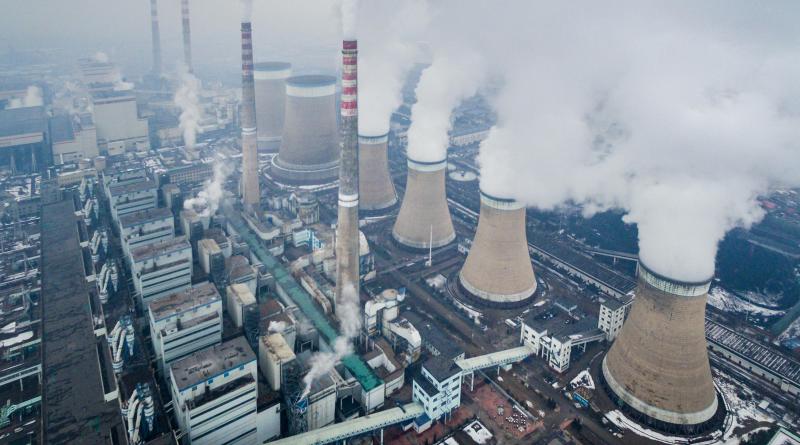The energy shortage afflicting China in the last few months is unprecedented. By now, Steel mills, aluminum smelters, and small-and-medium sized businesses in export-powerhouse provinces such as Jiangsu, Zhejiang and Guangdong have been told to cut back on their production because there is simply not enough power to go around. At least 20 provinces have suffered from power cuts and outages.
Hundreds of millions of Chinese people face the prospect of a cold winter with unreliable supply of heat.
This crisis ultimately translates into higher costs for consumers in the West and encourages the development of new supply chains away from China, yet another negative consequence for the country.
Mainstream media ascribe the energy crisis to (1) a combination high coal prices and (2) the government’s move to cut down on carbon emissions. The first one is simply a description of the effect; as for (2), there’s not much truth in it.
Behind the headlines, few people realize this crisis was entirely avoidable had China not informally banned Australian coal.
Rupture of Australia-China Bilateral Relations: Who is to Blame?
This crisis started about a year ago when the Chinese Communist Party all but ruptured China’s trade with Australia. Ostensibly, the catalyst was Australia calling for an inquiry into the origins of the COVID-19 pandemic.
Sometime around October of 2020, Chinese customs refused to allow bulk carriers carrying Australian coal (thermal and metallurgical) to unload despite the fact that it was already purchased and paid for by Chinese traders, steel mills and power plants. At the same time, China slapped punitive tariffs on a wide range of Australian products such as barley (81%), lobsters, wine (220%), beef and others. These moves effectively excluded Australian exports from Chinese markets and all but ruptured trade relations between the two countries.
Granted, there had been irritants between the two countries prior to this abrupt move by the Chinese government. Australia is a strategic competitor with China in the South Pacific. It is the first Western country to ban Huawei from its network. (What Western country isn’t afraid of Huawei?) At the same time, Australia also passed a strong anti-foreign interference law which makes it illegal for Australian citizens to engage in conduct on behalf of another foreign [read: Chinese] government.
Australia can’t be faulted for doing what it did. For years, China has launched relentless cyberattacks on the Australian government and mounted aggressive interference operations in Australian politics. Chinese tycoons attempted to use their money to buy influence from current and retired Australian politicians from the two main political parties. The Chinese Communist Party’s mouthpiece, the Global Times, frequently uses the most insulting language to attack Australia whenever the latter does something that displeases China.
The Law of Unintended Consequences at Work
Imagine wasting hundreds of billions of dollars, cutting the country’s GDP by a few percentage points (in dollar terms, hundreds of billions of dollars), and making life more difficult for hundreds of millions of people. These are the unintended consequences the Chinese leadership did not foresee.
That’s effectively shooting yourself in the foot. Consider how this played out:
a) Australian thermal coal is high-calorific. For decades, a large number of Chinese power plants have been configured to burn Australian thermal coal. Burning a different coal requires modifications which meant downtime and less energy produced.
b) Because Australian coal was banned, new supply has to be sourced from elsewhere. In 2019, Australia supplied 38% of the thermal coal (1.7 billion tonnes) burned in China. So that’s about 650 million tonnes of new coal supply that had to be found at short notice. But bulk commodity producers typically have most of their output locked up in long-term contracts. It takes time for them to raise production. In the meantime, the uncommitted output can be sold on the spot market at much higher prices.
c) Demand from Chinese buyers drives seaborne prices to well over $200 per tonne, lifting domestic prices higher. At one point, Chinese coal was selling close to $300 per tonne. The very same coal was selling for less than $100 at the beginning of 2020. The extra costs borne by Chinese utilities are conservatively estimated at between $150 – $200 billion.
d) In the meantime, Chinese steel mills turned to Canada, USA and elsewhere for the metallurgical coal they need. (Estimated annual consumption in China in 2021 is around 570 million tonnes of which domestic production was slightly less than 500 million tonnes. The rest had to be imported. The coal can be had, but at a premium. For example, in early October, Canadian metallurgical coal provided by Teck Resources of Canada was selling for about $650 per tonne as opposed to $395 for the same coal from Australia. A rough calculation suggests Chinese steel mills have had to fork out close to $50 billion more this year because they couldn’t buy Australian coal.
e) Tight overseas supply was made even tighter by natural disasters. In October alone, reportedly 60 coal mines in the top producing regions in China were forced to shut down due to heavy rain, flooding and landslides.
f) Chinese power plants are in an unwinnable position: the more electricity they generate by burning the high-priced coal, the more losses they incur because they cannot pass on the higher costs to consumers. As a result, they drag their feet, producing as little power as they could get away with.
More Negative Unintended Consequences for China to Come
By banning Australian coal, China hoped to deprive an important trading partner of an important source of revenue. Ironically, in the short term, its action created exactly the opposite. Australian coal companies were raking in record revenues. The Australian government, too, will indirectly benefit from the windfall prices.
China’s punitive trade actions against Australia backfired on it. The negative unintended consequences for China don’t end at lower growth, rising discontent among the population and an acceleration toward economic stagnation. Australia has now made a strategic decision to acquire a fleet of nuclear submarines. China’s hostile trade actions directed against Australia twelve months ago likely confirmed to Australia that it has nothing to lose by adopting a more assertive stance in defending itself.
Now that Australia, a junior power, will have nuclear submarines, it’s only a matter of time before bigger powers such as Japan and South Korea will want nuclear subs for their own navy. (Japan has signaled it will come to Taiwan’s aid in the event of an invasion; Japan’s security is inextricably linked to the U.S.’s.) The calculus of whether China will succeed in taking Taiwan by force has just changed maddeningly for the Chinese Communist Party in a way that they did not foresee.
The ongoing power shortage will further encourage more multinational companies to leave China for other more friendly jurisdictions elsewhere in Asia or closer to home.









